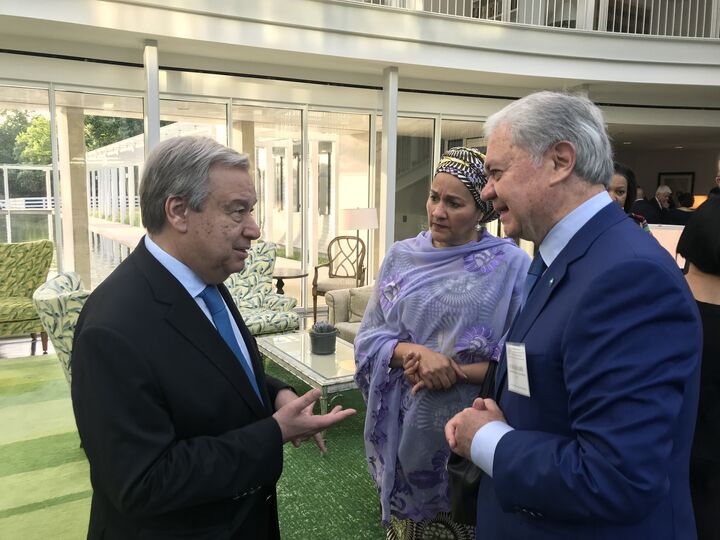Cooperation between the United Nations Organisation (UN) and regional and other organisations in maintaining international peace and security in accordance with Chapter VIII of the UN Charter is a key factor of the international collective security system.
At the invitation of the UN Chief Executive Antonio Guterres the SCO Secretary-General Rashid Alimov took part in a high-level interactive dialogue of the UN Secretary-General with the heads of regional and other organisations held at Greentree Estate, New York, on June 12-13.
In his opening remarks, the UN Secretary-General Antonio Guterres said that at this complicated stage in the development of international relations marked by rapidly changing character as well as interconnection of conflicts, the UN was unable to fully perform its functions without the cooperation and coordination with regional organisations. In this context early warning and the development of a new type of international relations — network multilateralism — takes on key significance. He said the UN was ready to work with the SCO in this area.
The interactive dialogue programme chaired by the UN Secretary-General was divided into three panel sessions which, in accordance with the Chatham House principles, saw an open and frank exchange of opinions between the UN Secretary-General, the heads of regional organisations and the heads of the UN structural units on current matters of improving coordination and cooperation with an emphasis on joint preventive activities.
In accordance with the dialogue programme, the SCO Secretary-General made the keynote speech at the opening of Panel session 2 titled "From Early Warning to Concrete Actions."
"Maintaining peace, security and stability as well as ensuring sustained development on the vast space from the Arctic to the Indian Ocean and from the Pacific to the Baltics has been and remains one of the key priorities for the Shanghai Cooperation Organisation. With the admission to the Organisation in 2017 of the two largest South Asian states — India and Pakistan — the potential of the SCO to counteract modern challenges and threats has grown considerably. By the same token, the responsibility of the Organisation which is the home to more than 43 percent of the Earth's population, has also grown," Rashid Alimov said at the start of his speech.
The SCO Secretary-General also noted that counteracting international terrorism and extremism was the key task of the SCO member states and that the basic legal framework comprising 42 conventions and agreements existed for addressing it in a comprehensive manner. Rashid Alimov briefed his colleagues on the joint efforts of the SCO member states to reveal, prevent and stop the threats arising in the SCO space stressing the effective work of the SCO Regional Anti-Terrorist Structure (RATS).
Rashid Alimov informed his colleagues about the decisions taken by the heads of SCO member states at the SCO summit (Qingdao, 9-10 June, 2018) drawing attention to the Qingdao Declaration of the SCO Member States, the Programme of Cooperation of SCO Member States in Combating Terrorism, Separatism and Extremism for 2019-2021, the Anti-Drug Strategy of SCO Member States for 2018-2023 and the Programme of Action forits Implementation and the Joint Address by the Heads of the SCO Member States to the Youth and the Programme of Action for its Implementation.
The discussion between the UN top officials and the heads of major regional organisations demonstrated the shared concern about the growing challenges and threats as well as the common commitment to jointly counteract them.
The event, along with the SCO, was attended by the heads of 18 biggest regional organisations: the Organisation for Security and Cooperation in Europe (OSCE), the African Union (AU), the Caribbean Community (CARICOM), the Commonwealth of Nations, the North Atlantic Treaty Organisation (NATO), the Arab League (LAS), the Commonwealth of Independent States (CIS), the Economic Community of Central African States (ECCAS), the Economic Community of West African States (ECOWAS), the Collective Security Treaty Organisation (CSTO), the European Union (EU), the Gulf Cooperation Council (GCC), the Ibero-American Summit, the Intergovernmental Authority on Development (IGAD), the International Organisation of La Francophonie (OIF), the Organisation of American States (OAS), and the Pacific Islands Forum and Southern African Development Community (SADC). Taking part in the high-level consultations were also First Deputy UN Secretary-General, seven Deputy UN Secretaries-General together with six heads of departments and structural units of the UN.
On the sidelines of the event, the UN Secretary-General held meetings with the Secretaries-General of the Organisation for Security and Cooperation in Europe (OSCE) Thomas Greminger, and the Arab League's Ahmed Gheit, First UN Deputy Secretary-General Amina Mohammed and Under-Secretary-General for Political Affairs Rosemary DiCarlo.
After the meeting the SCO Secretary-General flew to Beijing.
